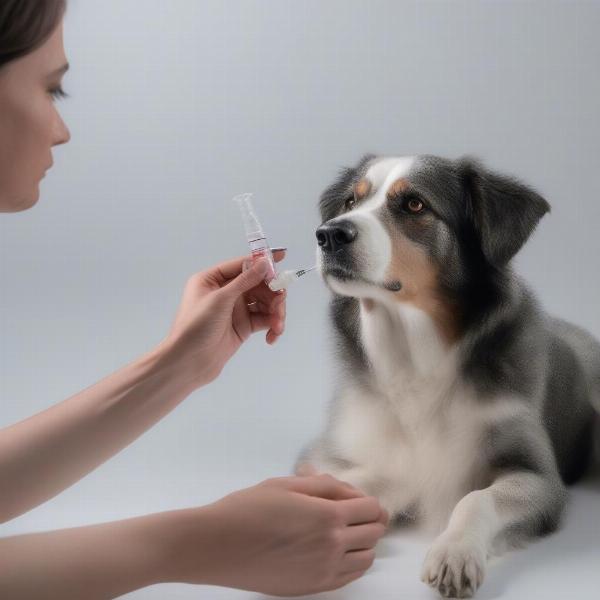Propalin, also known as phenylpropanolamine, is a medication commonly prescribed for dogs to manage urinary incontinence. This comprehensive guide will explore the uses, dosage, potential side effects, and important considerations for using Propalin in dogs. We’ll delve into the causes of incontinence, how Propalin works, and what to expect when administering this medication to your furry friend.
Understanding Urinary Incontinence in Dogs
Urinary incontinence is the involuntary leakage of urine. It can be distressing for both dogs and their owners. Several factors can contribute to incontinence, including hormonal imbalances, weakened sphincter muscles, bladder infections, and neurological issues. Identifying the underlying cause is crucial for effective treatment.
How Propalin Works
Propalin works by strengthening the urethral sphincter, the muscle that controls the flow of urine from the bladder. By increasing the tone of this muscle, Propalin helps prevent involuntary leakage. It’s important to note that Propalin is not a cure for incontinence, but rather a management tool.
Propalin Dosage and Administration
The correct dosage of Propalin for dogs varies depending on the individual dog’s weight and the severity of their incontinence. Your veterinarian will determine the appropriate dosage and frequency for your dog. Propalin is typically given orally, either as a liquid or in capsule form. It’s crucial to follow your veterinarian’s instructions carefully and never adjust the dosage without their guidance.
 Giving a dog Propalin medication
Giving a dog Propalin medication
Potential Side Effects of Propalin in Dogs
While generally considered safe, Propalin can cause some side effects in dogs. These may include restlessness, loss of appetite, increased thirst, and vomiting. In rare cases, more serious side effects such as seizures or allergic reactions can occur. If you observe any unusual behavior or symptoms in your dog after administering Propalin, contact your veterinarian immediately.
Important Considerations When Using Propalin
Before starting your dog on Propalin, it’s essential to discuss any pre-existing medical conditions or other medications they are taking with your veterinarian. Propalin may interact with certain drugs, so transparency is key. Additionally, regular monitoring of your dog’s progress is important to ensure the medication is effective and to adjust the dosage if needed.
When to Seek Veterinary Attention
If your dog’s incontinence worsens despite using Propalin or if they experience significant side effects, consult your veterinarian promptly. They may recommend further diagnostic tests to determine the underlying cause of the incontinence or suggest alternative treatment options.
Conclusion
Propalin can be an effective tool for managing urinary incontinence in dogs, improving their quality of life and reducing stress for owners. However, it’s crucial to work closely with your veterinarian to ensure proper dosage, monitor for side effects, and address any underlying health issues. By understanding how Propalin works and following your veterinarian’s guidance, you can help your furry friend live more comfortably.
FAQ
- How long does it take for Propalin to start working in dogs? It usually takes a few days to a week for Propalin to noticeably improve urinary incontinence.
- Can Propalin be used long-term? Yes, Propalin can be used for long-term management of incontinence, but regular veterinary checkups are necessary.
- What should I do if I miss a dose of Propalin? Give the missed dose as soon as you remember, unless it is close to the next scheduled dose. Do not double up on doses.
- Are there any natural alternatives to Propalin for dog incontinence? Some herbal remedies and dietary changes may help, but always consult your vet before trying alternatives.
- Can Propalin be used in pregnant or lactating dogs? The safety of Propalin during pregnancy and lactation hasn’t been fully established, so consult your veterinarian.
- Is Propalin the only medication for dog incontinence? No, there are other medications available, and your vet will determine the best option for your dog.
- Can incontinence be a sign of a serious underlying condition? Yes, it can be, which is why veterinary evaluation is crucial.
Find more helpful articles on ILM Dog:
ILM Dog is your global resource for expert dog care and breeding information. We’re passionate about providing reliable, practical advice to dog owners of all experience levels, worldwide. Whether you’re navigating the world of dog breeds, seeking guidance on health and medical care, training, nutrition, grooming, or finding the perfect products and accessories, ILM Dog is here to support you and your canine companion. Contact us today to learn more about our comprehensive resources: Email: [email protected], Phone: +44 20-3965-8624. Connect with us at ILM Dog for personalized support and expert advice.